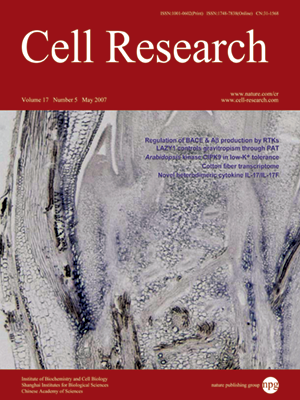
Volume 17, No 5, May 2007
ISSN: 1001-0602
EISSN: 1748-7838 2018
impact factor 17.848*
(Clarivate Analytics, 2019)
Volume 17 Issue 5, May 2007: 411-421
ORIGINAL ARTICLES
CIPK9: a calcium sensor-interacting protein kinase required for low-potassium tolerance in Arabidopsis
Girdhar K Pandey1, Yong Hwa Cheong1,2, Beom-Gi Kim1,3, John J Grant1, Legong Li1 and Sheng Luan1
1Department of Plant and Microbial Biology, University of California, Berkeley, CA 94720, USA
2Present address: Department of Bio-Environmental Science, Sunchon National University, Suncheon, Jeonnam 540-742, Korea
3Present address: Department of molecular physiology and Biochemistry, National Institute of Agricultural Biotechnology, Suwon 441-707, Korea
Correspondence: Sheng Luan(sluan@nature.berkeley.edu)
Potassium is one of the major macro-nutrients essential for a number of cellular processes in plants. Low potassium level in the soil represents a limiting factor for crop production. Recent studies have identified potassium transporters that are involved in potassium acquisition, and some of them are critical for potassium nutrition under low potassium conditions. However, little is understood on the molecular components involved in low potassium signaling and responses. We report here the identification of a calcineurin B-like protein-interacting protein kinase (CIPK9) as a critical regulator of low potassium response in Arabidopsis. The CIPK9 gene was responsive to abiotic stress conditions, and its transcript was inducible in both roots and shoots by potassium deprivation. Disruption of CIPK9 function rendered the mutant plants hypersensitive to low potassium media. Further analysis indicated that K+ uptake and content were not affected in the mutant plants, implying CIPK9 in the regulation of potassium utilization or sensing processes.
Cell Research (2007) 17: 411-421. doi: 10.1038/cr.2007.39; published online 8 May 2007
FULL TEXT | PDF
Browse 1799


